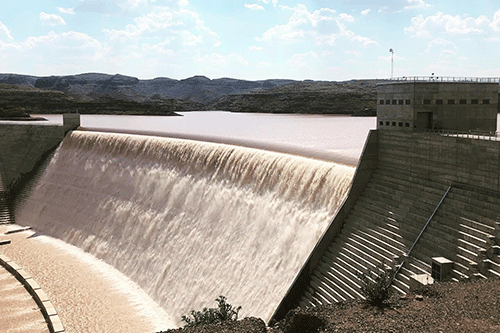Agriculture minister Calle Schlettwein has promoted the Neckartal dam as a real investment opportunity.
Speaking on Wednesday at the Namibia Investment Summit in Dubai, Schlettwein said the newly-constructed dam holds real potential for investors due to the availability of both water and land for irrigation, where a variety of crops can be planted.
He elucidated these while outlining investment opportunities in the agricultural sector, saying there are five brownfield projects, which includes the N$5.7 billion Neckartal dam in the //Kharas region, inaugurated in 2020. Brownfield refers to the continuation of existing projects or rebuilds on the site of older developments.
The Neckartal dam is the largest dam in the country with 830 million cubic meters, and can feed into an agricultural area of about 5 000 hectares.
“What we need is private capital to develop a large irrigation scheme on the 5 000 hectares that have the dam as its exclusive source of water. So, it is significant here for investors to link up with Namibia. We will also put the scheme onto the market through a request for proposal (RFP) that is going to be developed soon,” he added.
RFPs are expected to be issued to the market at the end of May or June this year. Schlettwein said leasing by government and sublease arrangements are to facilitate access, while operations require at least 10% for local participation.
“We believe that is a great opportunity where we have market access all over the world into the best-paying markets. We do not dictate to the investor what crop or whom to sell to, we just want to increase the production,” said Schlettwein.
For Namibia to compete with mass production in the sector is not the best option, but rather to focus on niche markets where the quality of Namibian products are a little better than those of competitors, or arrive a little bit earlier in the market. That is what he believes Namibia should do through diversification.
He added: “We will have to satisfy our domestic market with staples. Because of our small population, we will quickly reach a surplus situation, and it must be of high quality to yield the best financial returns in the market.”
According to the minister, the domestic agricultural policy is to broaden the old concept where agriculture ends at the farm gate. The ministry intends to manage the entire value chain, as the seamless operation from farm to trade to consumption is what is desperately needed in a modern agricultural system.
Furthermore, the country produces produce in a variable and dry climate. So, ecologically, Namibia moves on a boom-bust curve, especially when talking about extensive rain agriculture.
“Now, we realised that is not sustainable. We have to add resilience into this agriculture sector by introducing technology, intensive farming methods, diversify and integrate it properly, and the investment opportunities are in that part of agriculture,” elaborated the minister.
Schlettwein also briefed potential investors present that Namibia is the only country on the African continent that sells its beef to the best-paying markets. As such, he assured them that market access is not a problem anymore.
The agriculture minister continued that the country has about 11 green schemes on irrigated plots, where there is free water.
The green schemes were developed by government and outsourced to investors to run and operate for the country to move away from the concept of state farms to modern, privately-run agricultural production centres. According to Schlettwein, these centres need to be integrated with livestock and a smart mix of crops.
At the same occasion and contributing to why Namibia remains one of the favourable investment destinations on the continent, Leonie Hartmann, CEO of AvaGro Namibia said the country could also support food security in the United Arab Emirates (UAE).
She observed that Namibia has skilled graduates who are job-seeking, and the country has very advanced courses in agriculture and hydroponics in Namibian universities.
“We are ready to make your projects productive, efficient and well-managed. That will then allow you to get high yields that we can send and export through our logistics channels right to the UAE while they are still in fresh condition,” Hartmann said.


